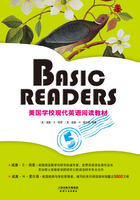
Books Are Storehouses
When Admiral Byrd went down to the bottom of the world to explore the regions of the South Pole, he carried with him a library of one thousand books. Think of it! If you read one book every day, it would take you nearly three years to finish that many. Admiral Byrd must indeed have thought that books were valuable to his men. He needed all the room in his ships for food, gasoline, and other supplies; yet he found a place for this large library.
Admiral Byrd knew that during his stay in the Polar regions there would be a long night of many months, when the sun would not shine. The men would have to stay inside, shut in by the darkness and the fierce storms, with very little to do. Books would give them many pleasant hours. Books would help them to forget that they were shut in.
So we can imagine these forty-two brave explorers quietly reading in the light of their lamps, with the terrific storms raging outside, and their building completely buried in snow. Here is one man reading a story of Africa. His mind is far away from the ice and snow; his book has carried him to a hot, sweltering country of wide grassy plains, sandy deserts, and thick jungles. Another man is reading of a land of great, busy cities full of people; he has for a time forgotten that for a thousand miles and more in every direction there is not another person in all the vast region where he and his comrades are.
Have you ever read about the Little Lame Prince and his magic cloak that took him wherever he wanted to go? Books are like magic cloaks; they can take us wherever we want to go. You could not go to the South Pole with Admiral Byrd; but you can read the book that he wrote. You cannot hunt lions in Africa, but you will read in this book of yours how three Boy Scouts hunted them.
Books can do even more than the magic cloak could do. It could only carry the Little Lame Prince to different places. But books can carry us into people's minds and show us what they have thought and learned. There are men and women who have spent years of hard, patient work finding out the wonderful things that are in this world of ours. All that they have learned and thought we can have for our own—wonderful and interesting facts about the stars, the trees and flowers, the animals, the great machines that do our work—all the things that are on the earth, in the earth, and even far down in the depths of the ocean waters.
Finally, books can carry us far, far back, thousands of years, and show us how people lived in those days. We can know the kinds of clothes they wore, the food they ate, the games they played, and even some of the jokes at which they laughed. Isn't it strange! Those people never dreamed of us; we could not possibly go back and live in their day. Yet we can know almost as much about them as we know about the people of our own times.
Now do you see why we say that books are storehouses? In them are stored up for us all the things that men and women have thought and done and learned for thousands of years. In them are kept the stories that people have loved through all time.